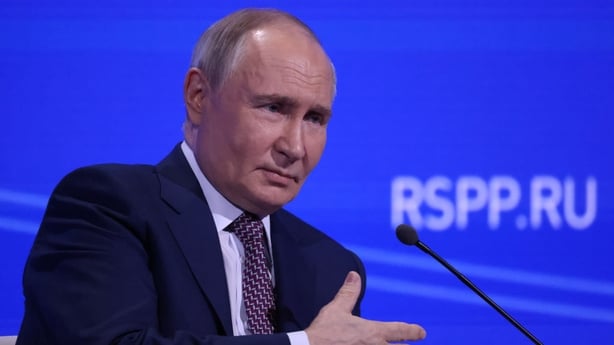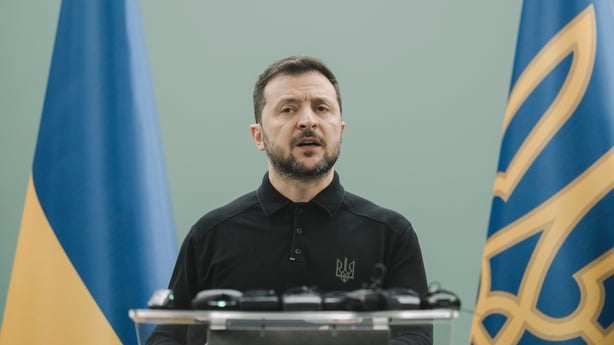Russian President Vladimir Putin has agreed to US President Donald Trump's proposal for a month-long halt to strikes against energy infrastructure in Ukraine, a limited ceasefire that Ukraine quickly said it would be willing to consider.
However, Russia stopped short of giving the United States the full 30-day cessation of hostilities it had sought, and experts say Mr Putin could be playing for time as Russian troops advance in eastern Ukraine.
Talks aimed at advancing toward a broader peace plan will begin immediately, the White House said following a lengthy call between the two leaders, but it was unclear whether Ukraine will be involved.
Mr Putin ordered the Russian military to stop attacks against energy sites after speaking with Mr Trump, the Kremlin said in a statement.
We need your consent to load this rte-player contentWe use rte-player to manage extra content that can set cookies on your device and collect data about your activity. Please review their details and accept them to load the content.Manage Preferences
But he again raised concerns during the call that a temporary ceasefire might allow Ukraine to mobilise more soldiers and rearm itself.
Mr Putin also emphasised that any resolution of the conflict would require an end to all military and intelligence assistance to Ukraine, the Kremlin added.
Ukraine President Volodymyr Zelenskiy said his country would consider supporting the US proposal to stop strikes on energy infrastructure.
"I think it will be right that we will have a conversation with President Trump and we will know in detail what the Russians offered the Americans or what the Americans offered the Russians," Mr Zelensky told reporters during an online briefing.
Russian forces are advancing in Ukraine's east and pushing back Ukrainian troops from Russia's Kursk region.

Negotiations on a maritime ceasefire in the Black Sea, as well as a more complete ceasefire and a permanent peace deal, will commence immediately in the Middle East, the White House said in a statement, though it did not say whether Ukraine would be invited.
Since Russia's 2022 invasion, Ukraine has tried to fight back against its much larger neighbour with drone and missile strikes deep in Russian territory, including on energy facilities.
Those attacks, which Russia says amount to terrorism, have allowed Ukraine to keep pressure on Russia's economy.
In a social media post after the call, Mr Trump said he and Mr Putin had agreed to work quickly toward a ceasefire and eventually a permanent peace agreement.
"Many elements of a Contract for Peace were discussed, including the fact that thousands of soldiers are being killed, and both President Putin and President Zelenskyy would like to see it end," he wrote, using an alternate spelling for the Ukrainian leader.
Ukraine said on 11 March it was prepared to accept a 30-day ceasefire, a step that US officials said would lead to a more substantial round of negotiations to end Europe's biggest conflict since World War Two.
The war has killed or wounded hundreds of thousands of people, displaced millions and reduced entire towns to rubble.
President Trump has hinted that a permanent peace deal could include territorial concessions by Ukraine and control of the Zaporizhzhia nuclear power plant.
Read more:
Putin 'sabotaging diplomacy' over ceasefire conditions, says Zelensky
Latest Ukraine stories
President Zelensky, who arrived in Helsinki for an official visit shortly after Mr Trump and Mr Putin's call ended, said Europe must be included in Ukraine peace talks.
The talks between the two leaders came as Israel resumed its attacks on Hamas in Gaza, threatening a fragile truce partially brokered by a Mr Trump envoy earlier this year and underscoring the difficulty of securing lasting ceasefires in long-running conflicts.
The two leaders also discussed how to prevent future conflicts in the Middle East and "shared the view that Iran should never be in a position to destroy Israel," the White House said.
The agreement on a narrow ceasefire reflects Mr Trump's desire to normalise relations with Russia and suggests that Mr Putin may be playing for time, said Susan Colbourn, an expert on European security issues at Duke University's Sanford School of Public Policy.
"It was striking how little concession Trump is asking from the Russians, although they invaded their neighbor," Ms Colbourn said.
The US President's overtures to Mr Putin since returning to the White House in January have left traditional US allies wary.

A ceasefire on attacking energy infrastructure could be favourable to Russia, given Ukrainian forces have been effectively attacking Russian oil refineries, said Maria Snegovaya, senior fellow at the Center for Strategic and International Studies.
Ukraine and its Western allies have long described Russia's invasion of Ukraine as an imperialist land grab, and Mr Zelensky has accused Mr Putin of deliberately prolonging the war.
Mr Zelensky says Ukraine's sovereignty is not negotiable and Russia must surrender the territory it has seized.
European Commission President Ursula von der Leyen warned that Russia had massively expanded its military-industrial production capacity in preparation for "future confrontation with European democracies."
Speaking at a press conference in Berlin with French President Emmanuel Macron, Germany's outgoing Chancellor Olaf Scholz said the limited ceasefire was an important first step but again called for a complete ceasefire. He reiterated that Ukraine must be part of any final decision.
In a call with Mr Trump last night, British Prime Minister Keir Starmer "reiterated that all must work together to put Ukraine in the strongest possible position to secure a just and lasting peace," the British leader's spokesperson said.
Russia seized the Crimean Peninsula from Ukraine in 2014 and most of four eastern Ukrainian regions following its invasion in February 2022.
All told, it controls about a fifth of Ukrainian territory.
Mr Putin said he sent troops into Ukraine because NATO's creeping expansion threatened Russia's security.
He has demanded Ukraine drop any ambition of joining the Western military alliance.
Mr Putin has also said Russia must keep control of Ukrainian territory it has seized, Western sanctions should be eased and Ukraine must stage a presidential election.
President Zelensky, elected in 2019, has remained in office under martial law he imposed because of the war.

